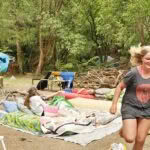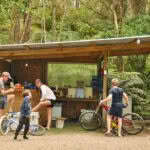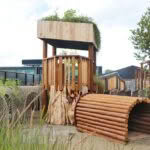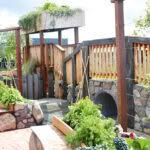This inspiring Northland family helps children reconnect with nature on their 40ha block
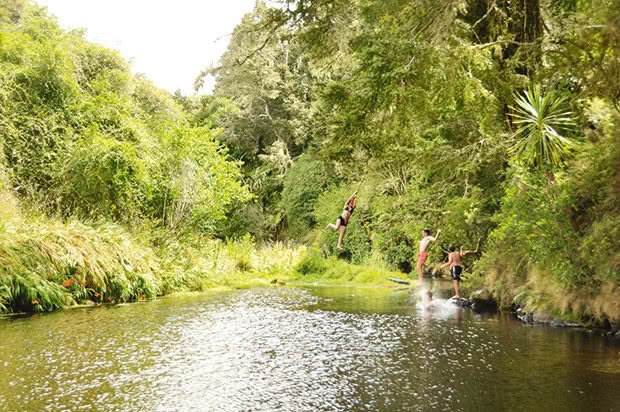
A Northland family share the healing powers of their land to help children in crisis, and it’s working.
Words: Sheryn Dean
Who: Anna Gentry, Dean Aplin, with Gaia, Riki, Shanti, and Nikau Aplin
What: 40ha (99 acres)
Where: Ngunguru, 20 minutes north of Whangarei
Web: natureplaynz.co.nz, facebook.com/natureplaynz
Swinging off ropes into the river, building huts, riding horses barefoot and bareback. Skinning your first possum, catching eels, sleeping around a roaring campfire. They were everyday childhood experiences for many children a generation or two ago but are something close to fairy tales for most children today.
Anna Gentry believes a relationship with nature is essential to wellbeing, so she’s creating those old-time childhood experiences to help a new generation with their mental health and wellbeing on her family’s Northland block. Anna and her family regularly host children who need to reconnect. Reconnect their relationship with nature, with family, friends, teachers, school, society, themselves. It’s all about relationships, says Anna.
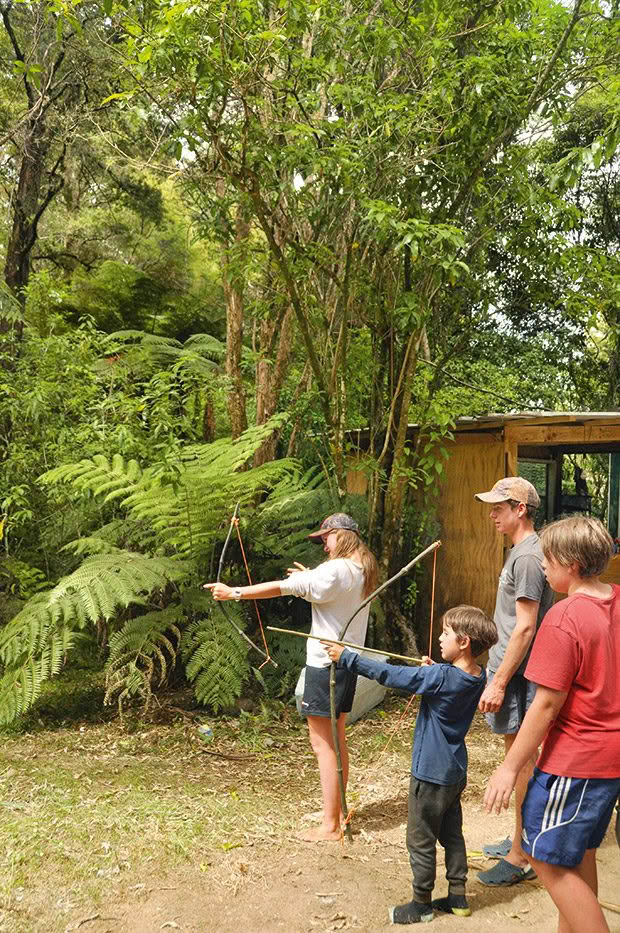
Ross and Jack Havercourt watch Nikau and Gaia Aplin try out the bows and arrows they’ve made.
The children come from all walks of life. Anna says there’s no immunity to challenges – anxiety, depression, bullying, life traumas – no matter what a child’s race, colour, or socio-economic group. When nothing else is working, children come to Anna and Dean’s place.
But it’s more than just a place. Under some shady trees on the banks of the Ngunguru River is a big table and a small kitchen hut. Out the back is the composting toilet. If you want a wash, you jump in the river. A bamboo pole suspended between two trees is the badminton net, the volleyball net, and the clothesline. Bean bags, mattresses, and blankets surround a fire pit.
There are no walls to confine you, no structure to rally against, no toys to destroy. There’s just nature, Anna, Dean, their children, and their visitors.
Anna and Dean are both educators. They met while teaching outdoor education beneath the mountains of the central North Island. Anna has a Diploma in Secondary Teaching and a Bachelor in Sports Science and NZ Ecology. Dean has a diploma in Outdoor Leadership.
Their block isn’t ‘therapy’, says Anna. She doesn’t like that word, as she says it sounds like there’s an impediment. Their method of dealing with wellbeing issues isn’t clinical, compulsory, or forced. “It’s all about telling children ‘I see you. I know how hard it is. You are not alone. Let’s just go with the flow and play this out.'”
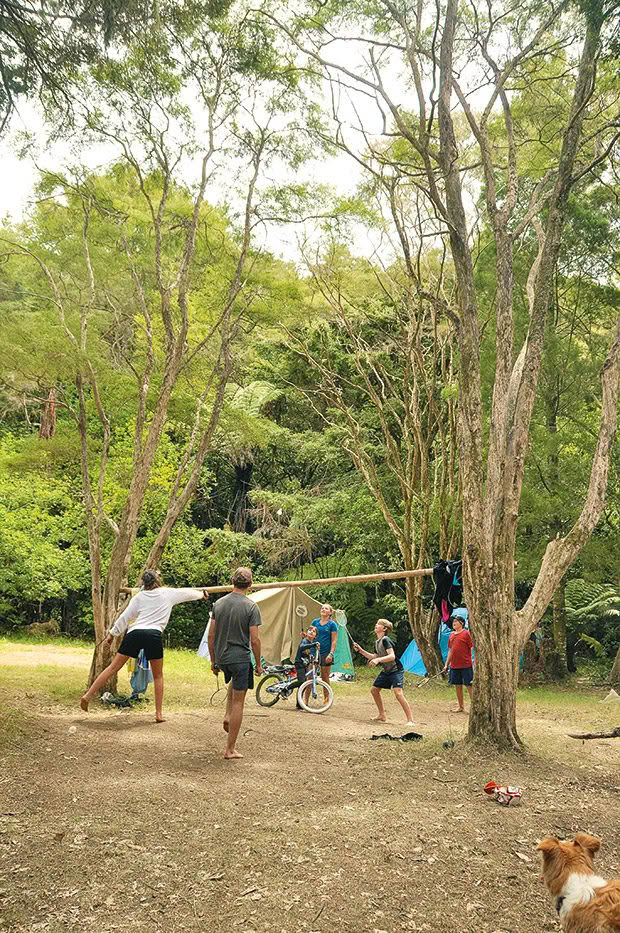
Playing is also a chance to learn about working together as a team and how to build relationships.
Anna says 90% of the healing is done by the land, what she calls Nature Power. Their children – Gaia, Shanti, Riki, and Nikau, aged from nine to 17 – also play a big part. They know how to make a bow and arrow out of a branch and a piece of string. How to build a hut up in the bush and ride a horse. By welcoming children into their family, Anna says inclusion and sharing happen naturally.
The whole concept has evolved naturally, as though destined to be, says Anna. She says it’s also partly down to luck, but there has been a lot of sweat and determination behind that luck.
Anna and Dean arrived in Ngunguru in 2006 with a mortgage, a 20-year-old chainsaw, a baby, and a dream. They lived in a tent for 18 months while they built themselves a shelter, planted fruit trees, dug gardens, and lived off the land. “People used to feel sorry for us and give us stuff, but I thought every day was wonderful.”
They were young and fit and soon had three children. Then, one day, Anna burnt out. At 34, she suddenly couldn’t function or get through a normal day, let alone the hard pace she had been keeping.
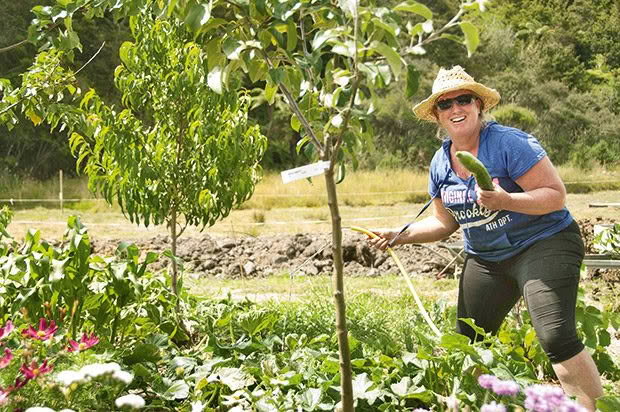
Anna says her flourishing permaculture garden is her happy place.
“I just crashed. Maybe glandular fever, some chronic fatigue in there… Doctors didn’t know and couldn’t help.” Dean gave up work to support her and care for their then three children (all less than three years old), and Anna tried numerous treatments to restore her health.
It wasn’t until she discovered First Light Flower Essences of New Zealand that she says things came back together. “With flower essences, you’re working on the metaphysical as well as the physical.”
With their health and lives back in order, their permaculture block established, and a new appreciation of self-care, Anna says they felt the need to give back to society. “We saw the inadequacies, the disconnect. We thought it can be better than this.”
She started hosting workshops on self-care. The couple began sustainably harvesting manuka and kanuka from their land and slicing it up to make building blocks. To Dean and Anna, it’s not just a plaything; it’s a way for children to experience the beauty and adaptability of the wood and learn to appreciate it.
This grew into a business called Nature Play NZ, providing support and guidance to educators establishing nature education programmes in early childhood centres and primary schools. They also designed, built, and planted natural playspaces in kindergartens and schools where children could experience and interact with nature. “We are educators. We knew nature, knew children, and understood risk.”
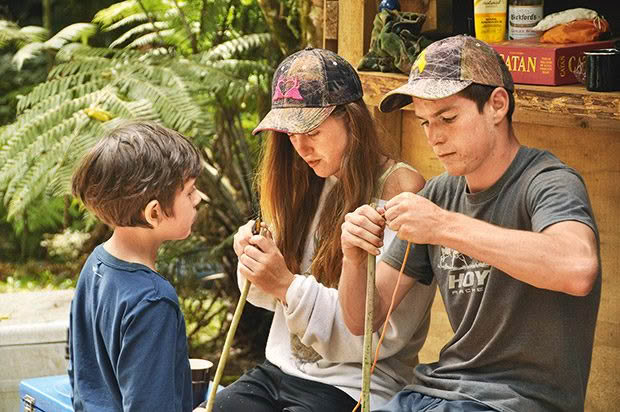
Jack Havercourt and Gaia Aplin using bush resources, teaching Nikau Aplin (left) how to make a bow from mahoe branches.
Meanwhile, they’d spotted 40ha of secluded, swampy, gorse-covered land beside the Ngunguru River, bordering the Glenbervie Forest. The gorse came out, fruit trees, gardens and post holes went in, and the horses moved in for the summer.
The couple had no clear plan or purpose in mind for their block, but the land seemed to dictate its use. It exudes an air of cool serenity in the Northland heat; add the river, the bush, and the horses, and it’s very tempting to stay, as friends, their children, and friends of friends often do.
Soon, psychologists and psychiatrists for the Ministry of Education asked if Anna could put together a programme for children in need. Where other treatments were failing, could Anna help?
“There is an unconscious osmosis that happens from being out in the New Zealand nature power. You put that alongside facilitators who have a conscious understanding of it, put them in the right place, and we see change.”
- Laying in after a night of marshmallows and story telling under the stars.
- The kitchen hut near the river is simple but sufficient.
Children come regularly, and occasionally parents or family do too. It’s all about relationships, says Anna. Today, the whole family is involved. Dean had been spending a lot of time away from home working on the landscaping side of Nature Play NZ, but wound it down in early 2020. His building tools are now in the ‘tinker zone’ where children channel destructive tendencies into constructive ones.
Gaia and Chanti, both home-schooled, provide a social base and share their horses in what is termed Equine-Assisted Learning. There are 21 horses, including the children’s performance ponies, who are therapy horses during the week, showjumpers and showhunters at the weekend.
There are also three Kaimaniwa ponies, four hacks, five retirees who sometimes pull therapy duty, and Puku, a greedy, 21-year-old Welsh pony who has taught everyone to ride.
Anna says working with horses forces the children to focus on the present, learn about responsibility, consequences, relationships, and how to regulate their emotions. Being in the bush teaches them independence, how to be adaptable, versatile, and problem solve.
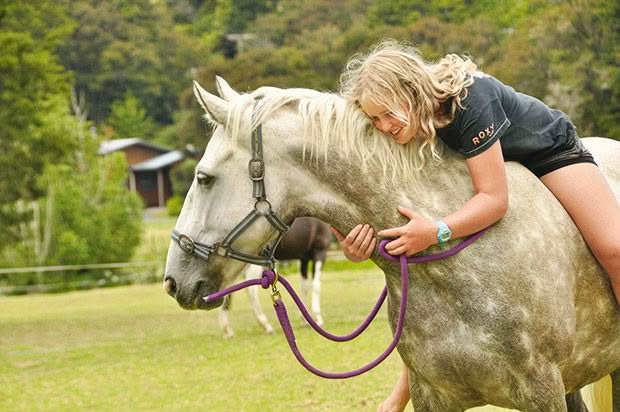
Shanti hugging Remembrance, a pony from the 2012 Kaimanawa muster.
Being with the family teaches visiting children about trust, loyalty, and love. The concept and the property are still evolving. Floods in 2020 drowned a few fences (or fertilised the flats if you see it as Anna does). The regional council has now assisted with protecting the riverbank.
The children are building swimming holes, villages, and hammocks in the bush, and Anna mentions it might all morph into adult workshops too.
The land, she says, came to them and complimented their lifelong skillset. Together, the family and nature have created an environment beneficial to everyone. Anna says it feels like it’s meant to be, and it’s too good not to share.
WHAT ARE FLOWER ESSENCES?
Flower essences are plant vibrations, plant energy, held in water. They’ve been used since ancient times to holistically bring all aspects of the being into alignment. Anna uses First Light Flower Essences which utilise the power of NZ’s endemic flora.
PLAYING IN NATURE
Anna Gentry says she’s quite sure that the best place to raise a child is in a ‘granny’s garden’.
“The kind of garden that is full of magical pathways lined with an eclectic mix of flowers, herbs, and edible plants to nibble on. It’s in this kind of place we work out how the world works without an adult even present.”
Anna and Dean designed and built the play space pictured above and below, one of 200 projects they created for early childhood centres and primary schools throughout NZ. It features espalier fruit trees, seasonal vegetables and herbs, tunnels, mounds, and huts with living roofs.
The goal of each unique playscape is to create suggestions for play, opportunities for children to use their physical, emotional, and spiritual bodies to guide them. “The ingredients, taonga, or gifts of nature, are selected to support the child’s fundamental need to connect with the living world, the world which sustains them, enabling the child to experience the beauty of nature as much as the security which it provides,” says Anna.
“I had grandparents who had backyards full of old fruit trees underplanted with seasonal crops. It was a necessity in their day, and we may find it a necessity again.”
Love this story? Subscribe now!
 This article first appeared in NZ Lifestyle Block Magazine.
This article first appeared in NZ Lifestyle Block Magazine.
